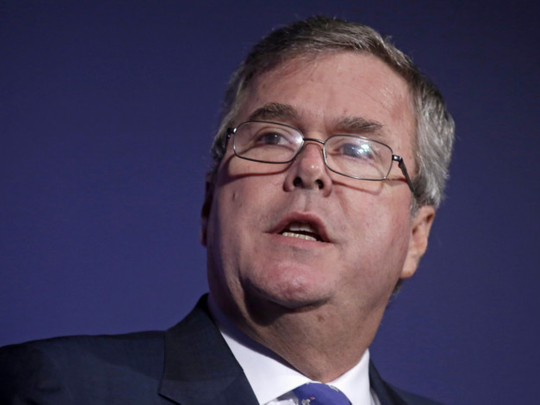
The Republican field for president has one stable centre of gravity right now — Senator Ted Cruz of Texas. Cruz does not dominate with ideas or fundraising prowess or his political network. He dominates with orthodoxy. As the most inflexible and unyielding conservative presidential prospect in a party with an inflexible and unyielding base, Cruz represents the pure religion against which the beliefs of other candidates are judged.
You can see the effects of Cruz’s gravitational pull on the retrograde orbit of Senator Marco Rubio of Florida. Rubio boldly championed immigration reform and seems eager to be identified with realistic policy ideas. However, his entrepreneurial streak has left the base sceptical of his motives and Rubio appears compromised and conflicted. Rand Paul is a more unconventional candidate than Rubio and more openly dismissive of some Republican orthodoxies — drug prohibition, muscular foreign policy, no voting rights for felons — though not the paramount commitment to protect the wealthy from downward redistribution. Rubio and Paul are properly portrayed as rivals, but the ambitions of both are constrained by the base’s orthodoxy and by Cruz’s determination, both to stoke and satisfy it. Under attack, Rubio ran away from his own immigration legislation. Similarly, Paul pointed out the wrongheadedness of Republican-engineered restrictions on voting (making a case on practical and political, rather than moral, grounds, but still), only to promptly retreat.
Right now, perhaps the best thing Paul and Rubio have going for them is each other. When Rubio proposes a thoughtful reform of student loans, he stretches the boundaries for Paul. When Paul says Republicans need to reach out to racial minorities — even with his own complicated history on race — or “agree to disagree” on social issues, he creates elbow room for Rubio.
But this two-man dynamic is not sufficient: Rubio remains battered by his attempt to solve a problem — immigration — which the base does not want solved, and Paul remains too much of a party outlier. They could use a hand from a third amigo: Jeb Bush.
By entering the presidential race, Bush will be a spokesman for sane conservatism, but he will also be another force pushing against the party’s contraction. His deliberately provocative comments on immigrants — in which he described crossing the border as an “act of love” — alienates him from the rank and file. And his refusal to walk away from his support for the Common Core education reforms will not help win those voters back. But by establishing himself as a Chamber of Commerce candidate, who refuses to kowtow to the Cruz wing, he can help loosen the straitjacket that keeps Republican politics and policy so dangerously restricted. That straitjacket strangled the 2012 Republican field. Texas Governor Rick Perry was clobbered for expressing empathy towards undocumented immigrants. Eventual nominee Mitt Romney spent the primary trumpeting his managerial superiority while insisting on his ideological fraternity with his opponents, right-wing loons included.
However, imagine a 2016 presidential primary that includes the quirky Paul, the straddling Rubio and the defiantly establishment yet Hispanic-friendly Bush. The party will be stretched instead of constricted. The opportunities for policy entrepreneurship will grow along with the chances of conservative politics based on something more broadly appealing than unremitting anger. The danger, of course, is that Cruz will dominate the angry base vote, while the three relative innovators competed over the party’s less-energised remainder. By splitting the libertarian and mainstream conservative vote, the three amigos may deliver the nomination to Cruz. The Texan, however, will no doubt face competition of his own, even if it is from flavour-of-the-moment candidates such as the former surgeon Ben Carson.
Besides, for Bush, the risk is worth taking. Paul’s appeal may be sufficiently idiosyncratic to power him to the end of the race, but not to victory. Either Rubio or Bush, however, will probably have to drop out without early primary victories and, of the two, Bush seems better suited to prevail. Ideally, once some ideological breathing space has been secured, whichever of the two is left standing can find a path to victory without having to endure Romneyesque contortions.
The alternative is likely another dispiriting primary season featuring candidates aping the base’s hostility to science, immigrants and tens upon tens of millions of their fellow American citizens. Republicans desperately need a candidate who can change that ugly scenario. Perhaps they need three.
— Washington Post
Francis Wilkinson writes editorials on politics and domestic policy for Bloomberg View.










